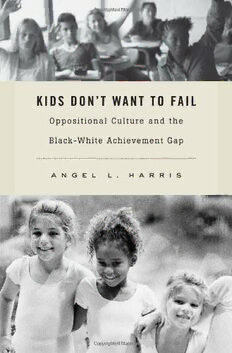
Kids Don't Want to Fail: Oppositional Culture and the Black-White Achievement Gap PDF
Preview Kids Don't Want to Fail: Oppositional Culture and the Black-White Achievement Gap
Kids don’t Want to Fail K i d s d o n ’ t W a n t t o F a i l Oppositional Culture and the Black-White Achievement Gap angel l. Harris Harvard University Press Cambridge, Mas sa chu setts London, En gland 2011 Copyright © 2011 by the President and Fellows of Harvard College all rights reserved Printed in the United States of America Library of Congress Cataloging-in-Publication Data Harris, Angel L., 1975– Kids don’t want to fail : oppositional culture and the Black-White achievement gap / Angel L. Harris. p. cm. Includes bibliographical references and index. ISBN 978-0-674-05772-2 (alk. paper) 1. African American students. 2. Academic achievement—United States. 3. Educational equalization—United States. 4. Minorities—Education—United States. I. Title. LC2717.H37 2011 371.829'96073—dc22 2011002394 To Okirah and Victoria Caitlyn Harris Contents Preface ix 1 Introduction to Oppositional Culture 1 2 Discrimination and Barriers: Basis for Black Cynicism toward Schooling 30 3 Origins of Youth Perceptions of Opportunity and Academic Investment 53 4 Effects of Youth Perceptions of Opportunity on Academic Achievement 74 5 Racial Differences in Academic Orientation of Youth 98 6 Should Blacks Become Raceless to Improve Achievement? 128 7 Shifting the Focus Away from Culture and toward Prior Skills 144 8 Does Marginalization Equal Resistance to Schooling? A Class-Based Analysis 163 9 Refocusing Understanding of Racial Differences in Academic Outcomes 180 C o n t e n t s Appendix A: Note of Caution about Testing 199 Appendix B: Sources of Data 203 Appendix C: Methodological Appendix 211 Appendix D: Description of Measures 235 Notes 273 Bibliography 283 Acknowledgments 303 Index 307 viii PreFaCe Since completing the Ph.D. program in Public Policy and Sociology at the University of Michigan in 2005, I have had countless discussions with many black people about the racial achievement gap. I am always struck by how the notion that black children resist education consistently emerges as the primary explanation for why they perform poorly aca- demically. Among these discussions, there are three instances that stand out and led me to the conclusion that this book needed to be written. In a recent trip to Mississippi, I talked to Mrs. Jones, a veteran middle school teacher, about her experiences in the classroom. I asked her why she thought black students performed worse than whites, to which she replied, “These kids just want to sit there and do nothing. They look at you like you are crazy. They just want to pass notes to each other all day long.” Her frus- tration was genuine, and I did not doubt her observations. I was humbled at the thought that her experiences and perceptions of black youth were simi- lar to those that I have heard countless times from other educators. I have even witnessed this belief among educators at the college level. An example of this is my experience with Dr. Smith. Dr. Smith received his Ph.D. from a prestigious institution and now works at a teaching college in the South that caters predominantly to black students. He is absolutely convinced that black students have an oppositional culture toward schooling. I sat in on several of his classes, in which he chastised the students for not being pre- pared for class. These “lectures” devolved into diatribes about how too many of the students at the university were preoccupied with their physical ap- pearance and “hooking-up” with one another, avoided taking challenging classes, and had a general apathy toward schooling. Such tirades were seam- lessly incorporated into his lectures, and the students seemed unsurprised. Dr. Smith’s go-to quote is: “These kids today don’t want anything out of life.” Dr. Smith’s story reminds me of the numerous educators that I have encountered throughout the United States who interpret poor acad emic per for mance as oppositionality.
